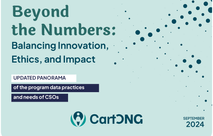New study: “Beyond numbers, balancing innovation, ethics and impact”

With a broader approach, in terms of geography and types of actors, the study tries analyze the impact of recent developments in both the Information Management and Data Analytics sectors, as well as those in Humanitarian Aid and International Development (AI, cybersecurity, accountability, localization, etc.).
After reflecting on the relative lack of evidence of the impact of data on decision-making, and of data collection still mainly driven by upward reporting, as well as on shortcomings in data quality, the study focuses on the state of professionalization of the sector. We also review the current needs of CSOs in terms of solutions and resources. With the profusion of technical solutions, the challenge seems more to be identifying the proper solution aligned to the CSO’s needs (including assessing needs); getting sufficient support and funding to properly implement it; and having access to learning resources and opportunities.
All these evolutions however need to take into account risk of a 2-tier humanitarian data system, with a growing gap between a few global actors (UN, major CSOs, donors, Global North NSOs…) and most of the others (most CSOs including the smaller international ones and local/national, Global South NSOs…). Without corrective action, smaller and local actors might enter in a vicious circle of suffering technical evolutions and increasing accountability requests without resources to appropriate / control them.
Our study then examines the current and future stakes of humanitarian data management highlighted by our survey respondents: first, data governance & localization, and accountability to affected populations, two topics that imply a deep transformation of our vision of data management. Then data-driven decision making, consistent strategies, and data literacy, the three components of a successful onboarding of data in CSOs. We then cover the connected topics of responsible data management and cybersecurity, two critical risks for the sector. We finally discuss standardisation, data sharing & open data, the legal and contractual environment, responsible use of AI, sustainable technologies, and mastered digital stakes, all stakes that imply adapting to evolutions while preserving the capacity of action of CSOs.
The study concludes with recommendations for the humanitarian system, for CSOs, for network heads, for donor & UN agencies, and for specialized support CSOs, in terms of promoting collective learning and critical thinking, continue proactively invest in program data and improving practices, and how to assists CSOs the data stakes evoked in the report.
A webinar to present the study was organized on 8 October 2024 and is available here: https://youtu.be/zzY0TrW4BjA